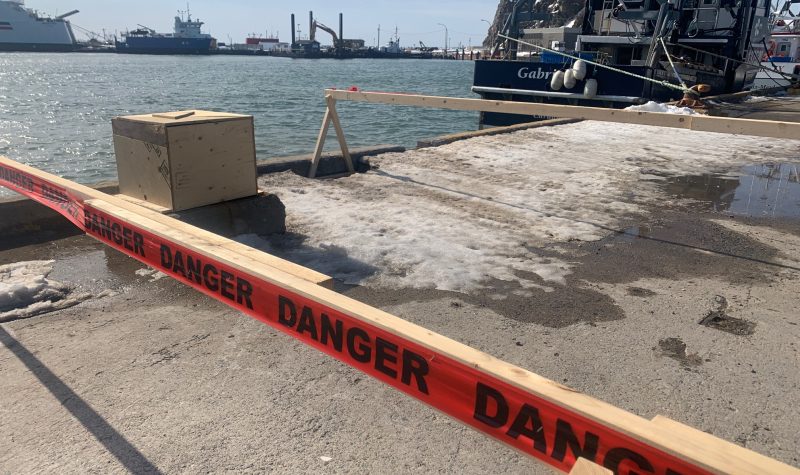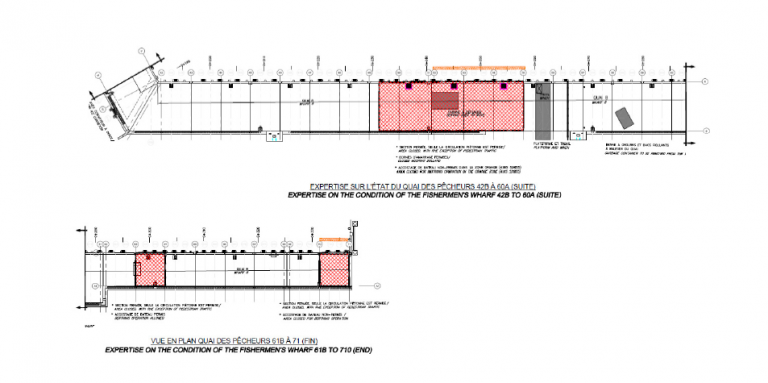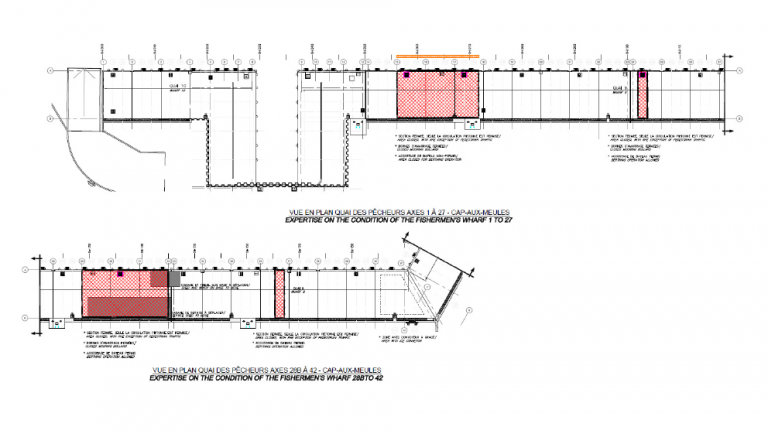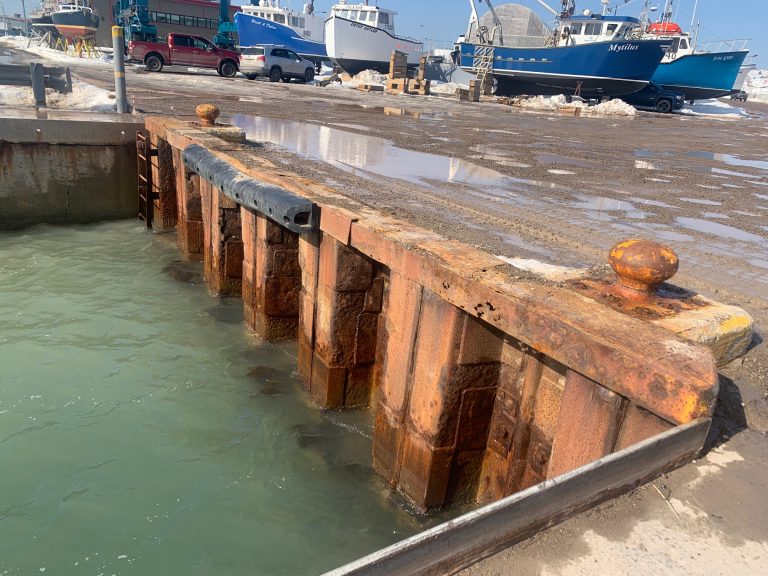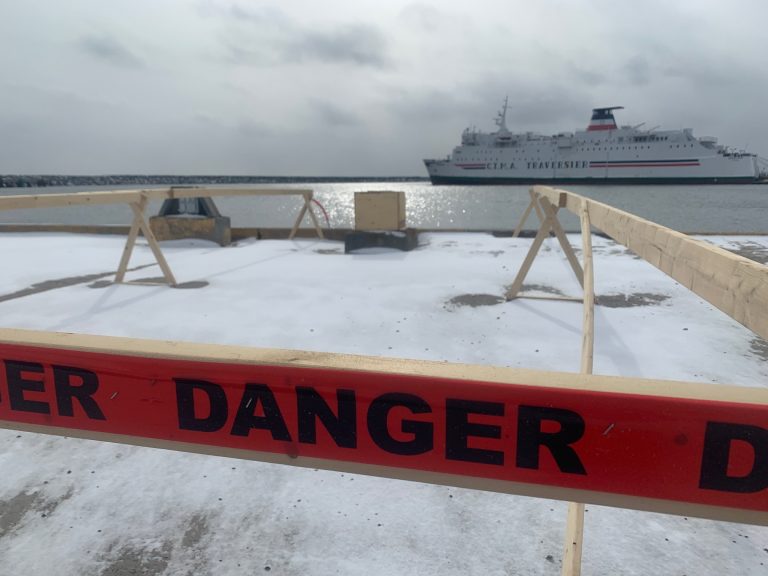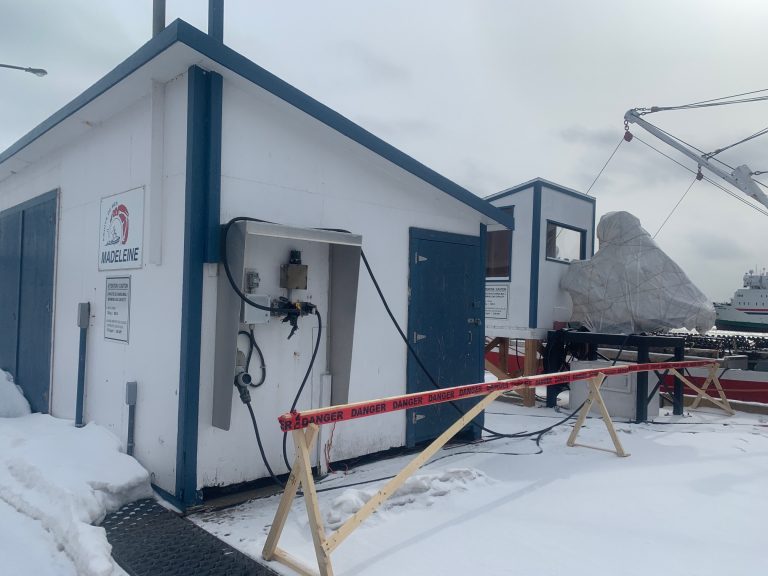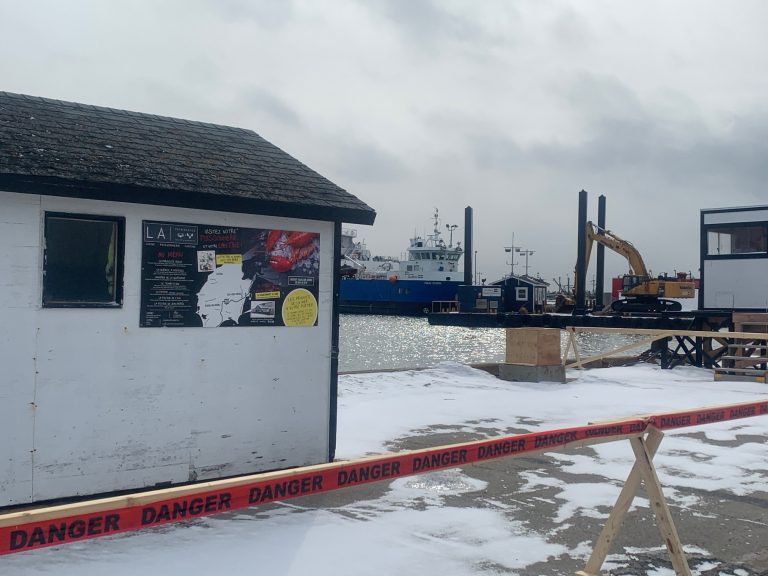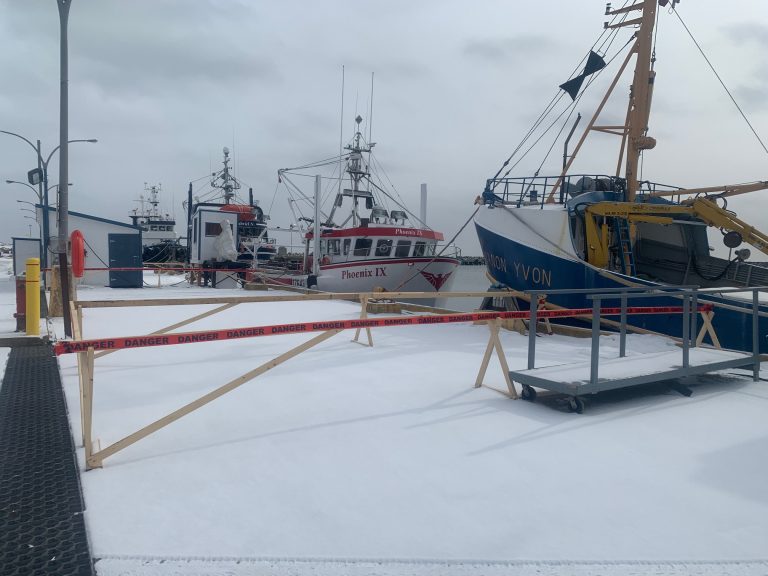Users of the fishermen's wharf at Cap-aux-Meules harbour (located opposite the local MAPAQ offices) received a notice of restriction of use two weeks ago, which condemned nearly half of the 24 mooring points located there.
In its notice dated Feb. 25, Transport Canada announced to occupants and users that a detailed inspection of the infrastructure carried out last fall revealed a deterioration of the wharf that resulted in a 37 per cent decrease in the coefficient of its load-bearing capacity compared to the last evaluation.
As a result, Lynn Daoust, the Quebec City-based regional director of programs for the federal department, has sent an e-mail stating that the use of loading cranes or heavy vehicles is now prohibited on the entire wharf.
She adds that some of the wharf's equipment will have to be relocated, such as the landing stations of the Fruits de mer Madeleine and LA Renaissance des Îles processing plants, which are connected to the electrical network and running water, without specifying a new location.
The notice also includes a plan to prohibit mooring on at least 11 of the 24 traditional berths on the fishermen's wharf in the northern and western sectors.
But the use restriction does not apply to the slipway, which is officially owned by CTMA, for the launching of lobster boats or pleasure craft, which must still be handled with the old gantry crane since the cement slab around the slipway has not yet been reinforced to support the 300-ton capacity crane.
In addition, Transport Canada has not yet issued the permit to occupy the slipway for the new RUPCAM equipment, financed by Quebec.
In addition, Ms. Daoust's notice mentions that cement curbs will be installed to delimit the new spaces that will now be closed to vehicular traffic, in addition to announcing that some of the mooring bollards will be condemned.
Some of the bollards are already covered with wooden cribs.
Fishing, seafood processing community remains upset

Captain Joselyn Theriault. Photo by CFIM.
The notice arrived a few weeks before the opening of the scallop fishery today and the snow crab fishery scheduled for early April.
Crab and scallop fisherman and president of the Regroupement des utilisateurs du port de Cap-aux-Meules (RUPCAM) Jocelyn Thériault, does not hide his indignation, nor his anger.
He denounces what he considers to be a flagrant laxity and a failure by the federal Department of Transport to meet its responsibilities as owner of the wharf, stating that users have been asking it for years to invest in the maintenance of infrastructure that is vital to the local economy.
For him, the access and mooring bans represent a catastrophy, particularly for mid-sized boats of 65 feet and more with a strong draft and which need a consequent depth to circulate, which cannot be found in any other port of the Islands.
In an interview, Thériault says that the Cap-aux-Meules port is the only one suited to welcome larger boats (in French only):
The manoeuvring space at the Cap-aux-Meules fishermen's wharf, which was already limited, will simply be insufficient, according to him, to ensure the safety of the sailors and the vessels, which, according to him, will have to "tie up to the shoulder" of each other, with an incessant rotation for unloading.
Pascal Harvie, director of operations at the Fruits de Mer Madeleine plant, estimates that between 80-85 per cent of the company's crab landings are made at Cap-aux-Meules.
Transport Canada's notice would force the company to move its building and catch receiving equipment, a complex and virtually impossible operation according to Harvie, considering the short time before the opening of the fishing season.
He deplores the fact that Fruits de Mer Madeleine had to pay for an engineering study on the load-bearing capacity of its wharf deck which was approved less than a year ago by Transport Canada in order to install an unloading hoist, and that the same department forced him to move it a few months later.
The workstation at the LA Renaissance des Îles plant was also affected by the ministry's use restriction.
Its director of operations, François Albert, estimates that approximately 60 per cent of its snow crab landings are made at the Cap-aux-Meules wharf.
He added that a dozen or so midshipmen from the Gaspé and New Brunswick are added to the regular Madelinot fishermen for the supply of LA Renaissance and that they will have to tie up somewhere while the traps are being anchored.
He also said that the particular geographical position of the archipelago in the Gulf means that large fishing boats often take shelter at the Cap-aux-Meules wharf in case of storms.
Thériault, Harvie and Albert, are asking Transport Canada to delay the application of the use restrictions, at least until 2022, considering that the safety risks would be greater by improvising a last-minute reorganization of operations, rather than by using the already restricted area of the wharf, even if it is in poor condition.
CTMA unhappy
Emmanuel Aucoin, director of the CTMA, is not surprised by Transport Canada's opinion, stating that a partial closure of the wharf was only a matter of time, given the department's usual methodology when it comes to maintaining its own infrastructure.
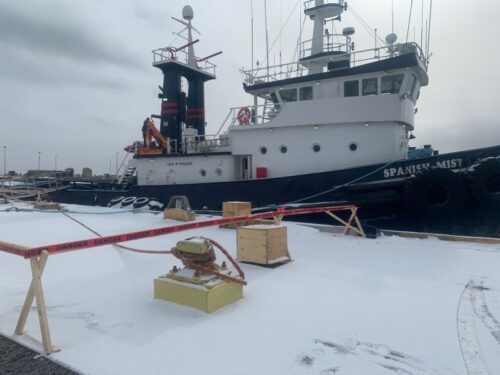
The CTMA tugboat "Spanish Mist." Photo by CFIM.
According to him, the federal department's office in Quebec City is not aware of the importance of the Cap-aux-Meules wharf for the Magdalen community.
He specifies that the inspection of the wharf last fall was not related to the file of reinforcement of the slipway for the new gantry crane. According to Aucoin, the department has for many years limited itself to mandatory minimum inspections of the condition of the carrying capacity.
He points out that moving the mooring space for CTMA's large tugboat, the Spanish Mist, is out of the question since the vessel has a special power facility there.
But Aucoin says he has suggested solutions to the department, including the purchase of balloons to be placed between the wharf and the tugboat, which would be moored in guards or points, rather than across the wharf, to reduce the pressure on the condemned portion of the wharf.
Here is Aucoin speaking (in French only):
The CTMA also proposes to help out midshipmen who do not have mooring spaces by offering temporary spaces at the ferry dock or at the Voyageur II dock when the ships are out.
Minister Diane Lebouthillier reacts
Diane Lebouthillier, federal minister of National Revenue and MP for Gaspésie—Les Îles-de-la-Madeleine, learned of Transport Canada's decision about ten days ago, following a call from the CTMA's director general.

The Minister of National Revenue, Diane Lebouthillier. Photo by CFIM.
She said she immediately spoke twice with her counterpart at Transport Canada, Omar Alghabra, to explain the importance of operations at the Cap-aux-Meules fishermen's wharf, which could not be relocated elsewhere, such as on the mainland, given the archipelago's island nature.
She also requests that Transport Canada maintain the operational status quo of the wharf and its infrastructures this year in order to properly reflect on an action plan with maintenance investments for the future.
Following a recent request for information from CFIM regarding the work to adjust the boarding ramp at the ferry dock, Transport Canada's Media Relations department specified that no other work projects were planned at the Cap-aux-Meules dock.
Transport Canada reacts
Transport Canada states that it is evaluating the various possible options to mitigate the effects of the closure of a portion of the Cap-aux-Meules wharf after an evaluation conducted in the fall of 2020 revealed a degradation of the harbour facilities that was deemed significant.
By e-mail, the department confirmed that discussions are underway with the various stakeholders involved, including CTMA, to identify other mooring spaces for crabbers.
A security officer has been deployed on site to make users aware of the new guidelines in effect.
Concrete bumpers will be installed as well as signage and markings on the ground to allow for some continuity of operations.
Transport Canada also mentions that major work was carried out in 2015 in the Cap-aux-Meules harbour, consisting of repairing certain concrete elements under the wharf and replacing the cathodic protection used to slow down the corrosion of steel piles.
Surveys conducted last fall revealed that the wharf's bearing capacity had dropped from 19 kilo pascal to 12, a 37 per cent decrease in its capacity.


